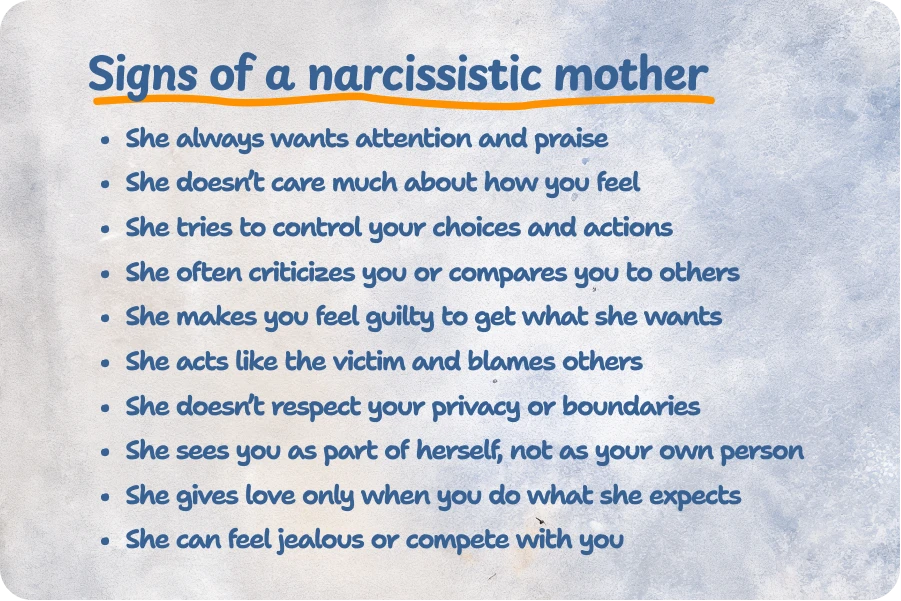A mother with strong narcissistic traits may try to control many aspects of her child’s life and often struggles to respect emotional or physical boundaries. She might rely on guilt, manipulation, or emotional withdrawal to maintain a sense of superiority. These behaviors often come from deep insecurity and a lack of empathy, rather than genuine malice.
If this sounds like your mother, you might have grown up with a narcissistic parent. Find out the signs of narcissistic behavior, how a narcissistic mother affects your mental health, and how to protect your well-being.
What Is a Narcissistic Mother?
Narcissistic mothers tend to be self-centered and overly critical, consider themselves special, demand admiration, and have difficulty expressing emotions. They are often focused on their own needs and can neglect the feelings of their children.
A narcissistic parent may manipulate and lie to maintain control and their image of a unique and perfect “supermom” and “superwoman”. They can view motherhood as just another area in which they must excel. Because of this, her children may feel constant pressure to perform, fear making mistakes, and grow up believing love must be earned through achievement rather than being unconditional.
Wondering if you’re the son or daughter of a narcissistic mother and how it affected your mental health? The Breeze app offers self-discovery tests about your childhood trauma, emotional intelligence, relationships, personality, career, goals, and values.
Narcissistic Mother Common Traits and Behaviors
While only a psychotherapist can diagnose someone with narcissistic personality disorder, let’s have a look at common signs that may indicate a potential disorder or narcissistic traits, according to the book by Shahida Arabi, “Healing the Adult Children of Narcissists: Essays on The Invisible War Zone and Exercises for Recovery, a #1 Bestseller in Applied Psychology” [1].
These traits often exist on a spectrum and may show up more strongly under stress, in specific relationships, or as coping mechanisms shaped by early life experiences. The following section examines patterns of behavior that can be harmful, particularly in parent-child dynamics, regardless of whether the parent has a clinical diagnosis.

1. She cares more about appearances than her children’s needs
Since a narcissistic mother usually needs social approval, she may do anything to create the image of a caring and loving parent. Behind closed doors, her children can experience constant criticism, yet in public, she brags about their accomplishments.
For example, she might proudly tell others that her son always earns the highest grades and her daughter is the prettiest in class. But at home, she snaps at her son for taking too long with his homework and mocks her daughter for her appearance.
2. She sees children as an extension of herself
Some parents with narcissistic traits struggle to recognize their child as a separate person with their own identity, preferences, and needs. Instead, they may see their child’s successes as reflections of their own worth. When the child achieves something, the parent may take full credit or minimize the child’s effort, suggesting they wouldn’t have succeeded without the parent’s guidance.
If you grew up with a cold mother, you may have learned to hide your own feelings to avoid criticism or rejection. Learning how to feel your feelings is the first step toward a strong sense of self-worth. Take the Emotional Intelligence Test to discover how well you understand and manage your own emotions.
3. She shames her children
A narcissistic parent may shame her children for underachieving academically, socially, professionally, or in their adult relationships. She shames them for what she considers to be poor career choices, partners, friends, lifestyle choices, and even outfits. She may also shame them for their character, personal qualities, and preferences. In this way, she makes them feel worthless and insecure, regardless of their achievements and successes.
Does your mother constantly shame you?
4. She compares her children with each other or with their peers
A parent with narcissistic traits might imply that a child isn’t smart, obedient, or successful enough, often out of their own perfectionism or fragile self‑esteem. This can lead to frequent comparisons, such as “Why don’t you follow your sister’s example?” which create tension and competition among siblings. Such patterns can form dysfunctional family roles, where one child becomes the “golden child” receiving praise and attention, while another feels like the black sheep, blamed for problems and left wondering, “Why am I such a failure and a burden to everyone?”
These dynamics can deeply affect children’s sense of belonging and self‑worth, sometimes leading to loneliness, anxiety, or depression, according to a 2024 study on the “black sheep” phenomenon [2].
Expert Insight
Children of mothers with narcissistic traits often adapt in different ways depending on their temperament, attachment style, birth order, and the specific role they were assigned in the family system. Some become people-pleasers; they may be hyperattuned to others’ emotions, striving to earn love through compliance and caretaking. This is often a survival strategy rooted in fawning, a trauma response aimed at minimizing conflict and preserving connection. Others may cope by becoming distant or rebellious, especially if they learned early on that no amount of pleasing would result in safety or approval. These children may protect themselves by emotionally detaching or asserting control in other areas of life. Both patterns are adaptive responses to relational trauma and can be unlearned with compassionate support and boundaries.
Abigail Fernald
Mental health professional
5. She can’t maintain healthy boundaries
A narcissistic mother may become so enmeshed in her children’s lives that they become the center of her world and feel responsible for meeting her emotional needs. Rather than taking on the role of an adult with an authoritative parenting style, she “parentifies” her children, guilt-tripping them for not fulfilling her expectations.
Besides, she ignores her children’s basic need for personal space and independence, demanding to know every detail of their lives. She may enter their rooms without knocking, read personal diaries, and constantly question them about their friends or romantic relationships.
6. She tries to stop the process of growing up
A parent with narcissistic traits might resist or discourage their child’s steps toward autonomy, such as moving out, dating, setting boundaries, or expressing individuality. She may perceive these milestones as threats, particularly if her sense of identity hinges on feeling needed or in control. Rather than celebrating her child’s growth, she may respond with guilt-tripping, criticism, or emotional withdrawal.
7. She may be emotionally unstable
A narcissistic parent is prone to sudden outbursts of anger and equally sudden periods of kindness and affection when she needs something from her children. It creates an atmosphere of chaos and uncertainty in her family, where children learn to walk on eggshells, afraid of triggering their mother’s anger, facing punishment, or emotional outbursts.
Do you have emotional baggage associated with narcissistic parenting? Take the childhood trauma test to get insights and break free from emotional abuse.
8. She emotionally invalidates her children, guilt-trips, and gaslights them
Children raised by narcissistic parents may experience emotional neglect, invalidation, and emotional abuse. “I didn’t say that,” “It’s for your own good,” “It’s not my fault you took it that way” are typical phrases a child may hear. This gaslighting makes them doubt their own perception of reality and wonder, “Why am I so sensitive?” or “Why am I so emotional?“
Narcissistic parents may also use the “3 D’s” (or sometimes 4 D’s) to maintain control: Deny, Deflect, Devalue, and Dismiss. These tactics keep their children in a shame spiral, making it hard to trust their own experiences:
- deny their actions,
- deflect blame onto others,
- devalue your feelings or accomplishments,
- dismiss your emotions as unimportant.
9. She plays a victim
A covert narcissist mother may create a victim image of herself as vulnerable, sensitive, empathetic, and at the same time misunderstood and unaccepted, according to research on covert narcissism [3]. The purpose of this emotional manipulation is to make her children think, “Why do I feel guilty all the time?” This type of narcissistic mother will complain about her life, health, and relationships, and accuse their children of inappropriate behavior, ungratefulness, and unfair treatment.
10. She exerts control through domination
In any situation, an overt narcissistic mother may impose her opinion and insist that hers is the only correct one. And those who disagree will be instantly thrown off balance with criticism and devaluation. For instance, to regain control and make her adult children experience self-doubt, she may ask tactless questions like “Who told you that outfit is okay to wear?” or “Do you think anyone takes you seriously?” that put them in an awkward position.
The Impact of a Narcissistic Mother on Children
Some children of narcissistic parents may come to associate love or approval with compliance, which can contribute to patterns of people-pleasing or low self-worth. They may also have parentification trauma or adult child syndrome, feeling responsible for their narcissistic mother’s emotions and believing that her anger or sadness is their fault. This, in turn, creates confusion about setting boundaries and makes them wonder, “Why do I feel lost?”. Moreover, 2023 research says that parental narcissistic abuse leads to mental health conditions such as anxiety and depression in children via scapegoating [6].
In adulthood, children of narcissistic mothers may have difficulties trusting others or expressing emotions openly. As a result of attachment trauma caused by an emotionally unavailable narcissistic mother, children may develop an insecure attachment style, according to research on how attachment style influences early childhood development [5]. They may become anxious and clingy because of the fear of abandonment or distant and avoidant, suppressing their emotions to protect themselves from potential rejection or criticism.
Find out your attachment style and how it can affect your romantic relationships, friendships, and overall sense of self-worth.
Daughters of Narcissistic Mothers
According to a 2022 study on the effects of parental praise and criticism, growing up with a narcissistic mother can deeply affect a daughter’s self-esteem, emotional development, and relationships [4]. While such parents may value their child’s success, they may also struggle when their child’s accomplishments evoke comparison, competition, or feelings of inadequacy.
In some families, daughters may be criticized for their appearance or choices, which can lead to internalized shame or the belief that love must be earned through perfection. As a result, it may negatively impact a daughter’s self-esteem and make her prioritize other people’s needs over her own feelings.
In adulthood, this can show up in fear of intimacy and the belief that her worth depends on others’ approval. Eventually, daughters of narcissistic mothers may be more susceptible to narcissistic abuse and later wonder, “Why do I attract narcissists?“
Sons of Narcissistic Mothers
Some narcissistic mothers may view their sons either as a “golden child” to reflect their own superiority or as a target for criticism if he fails to meet their expectations. Because their mother’s love is conditional, sons may internalize feelings of shame and anxiety. A son of a narcissistic mother may have low self-esteem, but externally be overconfident, struggle to identify and express their emotions, be emotionally available, and regulate nervous system.
In adulthood, some may become overly independent and avoid vulnerability, wondering, “Why do I push people away?“. Others may seek external validation and think, “Why do I get attached so easily?“
Healing From the Trauma of a Narcissistic Mother
In her book “Will I Ever Be Good Enough? Healing the Daughters of Narcissistic Mothers,” a licensed marriage and family therapist, Dr. Karyl McBride, who specializes in the effects of narcissism, particularly on children of narcissistic parents, writes a lot about the recovery process:
1. Experience the grief of not having the mother you dreamed of
Firstly, understand that you experienced emotional neglect, criticism, and narcissistic abuse in childhood. Allow yourself to grieve the loss of the warm and supportive relationship that your narcissistic parent never provided.
One helpful tool during this stage is Breeze journaling: take a few minutes each day to write freely about your feelings, memories, and frustrations. Don’t worry about structure and simply let your emotions flow onto the page. According to research on journaling, it can improve your mental and physical well-being because it helps process emotions, reduce stress, and build resilience [7].

Dr. McBride suggests not listening to other people’s opinions while you’re in this process. Even with the best of intentions, friends and loved ones may say things like, “Get over it,” “You can’t change the past, stop trying,” and “Stop dwelling on the past. Live in the here and now.” Try to confront your sadness to change your life.
2. Separate psychologically from your mother and reframe the negative beliefs you received from her
The second step in recovery involves understanding the patterns and behaviors you may have absorbed from a narcissistic parent. Common patterns include:
- People-pleasing
- Self-doubt
- Perfectionism and impostor syndrome
- Feeling guilty when you assert boundaries
When you identify these inherited behaviors and self-critical thoughts, you may learn how to love yourself and make decisions based on your values rather than seeking approval. Practical exercises for this step include:
- Track your triggers
Note times when you feel the need to please others or doubt yourself, and think about why you react this way. Use the Breeze app to track your daily moods, triggers, and emotional reactions. This can help you see patterns, understand emotions, and measure progress.

- Role-playing boundaries
Imagine a friend asks you to help them with a project, but you don’t have the time or energy. In a role-playing exercise, you might practice saying:
- “I’m sorry, I can’t help right now. I need to focus on my priorities.”
- “I’m happy to support you another time, but I can’t commit to this today.”
- Rewriting self-talk
Replace negative internal messages with compassionate, affirming statements that reflect your self-worth:
- Instead of “I’m not good enough,” say “I am worthy and capable just as I am.”
- Instead of “I always mess things up,” say “I am learning and growing every day.”
- Instead of “I have to please everyone to be loved,” say “I deserve respect and can honor my own needs.”
- Instead of “I can’t say no without feeling guilty,” say “It’s okay to set boundaries to protect my well-being.”
You can also use Breeze positive affirmations in the app to reinforce healthy thinking patterns.

3. Allow guilt
McBride notes that many daughters of narcissistic mothers struggle with guilt or uneasiness when talking about their mothers in therapy. This isn’t because their pain is invalid, but because they’ve often been taught to silence it. Thoughts like “Maybe it wasn’t that bad” or “I shouldn’t feel this way” are common responses to years of emotional gaslighting or conditional love.
If this resonates with you, know that your emotions are valid, even the conflicting ones. It’s okay to feel sadness, anger, or confusion. Allowing yourself to feel is an act of self-trust and healing, not a betrayal of your parent.
4. Try new communication strategies with your mother
This is something to try once clinically appropriate, with the support of a professional or a self-care plan in place:
- If your mother starts talking about her problems while you’re sharing yours, gently interrupt: “I understand that this is hard for you too, but right now it’s important for me to discuss my situation. Let’s talk about yours later.”
- If she continues, cut the conversation short: “I see that now is not the best time to discuss it. Let’s talk another time.”
- Try not to make excuses, as this gives her an opportunity to manipulate.
5. Seek therapy
With a mental health professional, in a supportive and safe environment, you can analyze your painful experience of growing up with a narcissistic mother and learn to treat yourself with compassion and acceptance.
Coping With a Narcissistic Mother as an Adult
Some people with narcissistic personality disorder may find meaningful change or effective treatment challenging. The desire to change is key, and narcissistic clients, when first seeing a therapist, tend to focus on finding answers to questions about how to interact with others. They usually don’t consider that the problem might lie within themselves.
If your mother is unable to change and you’re constantly being attacked and insulted, minimizing contact can be one of the best options to protect your mental health. This way, your interactions can become more civil. It works best after you’ve completed your healing journey, accepted your mother’s limitations, and truly separated from her.
Expert Insight
Coping with a mother with narcissistic traits in adulthood often requires setting clear boundaries and unlearning patterns rooted in childhood survival strategies. Many adult children of narcissistic parents struggle with guilt, self-doubt, or people-pleasing, so working with a therapist who understands family trauma and attachment dynamics can be helpful. Remember that you’re allowed to protect your peace, even if that means limiting contact or redefining your relationship. Practices like journaling, inner child work, and mindfulness can help you reconnect with your authentic needs and values. Healing also involves grieving the parent you may have needed but didn’t have, while learning to meet those unmet needs in healthier ways.
Abigail Fernald
Mental health professional
Frequently asked questions
1. What are the 3 D’s / 4 D’s of narcissism?
3 D’s or 4 D’s of narcissism are common manipulative tactics such as Deny, Dismiss, Devalue, and sometimes Discredit. People with narcissistic traits may use them to avoid responsibility, twist reality, and keep control in relationships.
2. What’s the difference between a narcissistic mother and a controlling mother?
A controlling mother wants to manage your life, but a narcissistic mother goes further because she may need external validation, lacks empathy, and may see your independence as a threat. Mother’s narcissism shows up in protecting her ego, not your well-being.
3. How do you emotionally detach from a narcissistic mother?
Start by setting boundaries and limiting emotional reactions and self-blame. Focus on self-care, seek therapy, and form a healthy support system to build a strong sense of self and your own values.
4. Can children of narcissistic mothers become narcissists themselves?
Yes, it’s possible, especially if they model the behavior of a narcissistic parent or never receive validation in healthy relationships. However, many children develop people-pleasing traits or insecure attachment style instead, or break the cycle through self-awareness and therapy.
Sources
- Shahida Arabi. Healing the Adult Children of Narcissists: Essays on The Invisible War Zone and Exercises for Recovery. January 2019
- Merav Kalik Lerner, Sabina Lissitsa. “Black sheep”—physical, social, and behavioral diversity as a barrier to STEM educational choice. December 2024
- Mallory L. Malkin, Christopher T. Barry, Virgil Zeigler-Hill. “Covert narcissism as a predictor of internalizing symptoms after performance feedback in adolescents.” October 2011
- van Houtum, L. A. E. M., Will, G. J., Wever, M. C. M., Janssen, L. H. C., van Schie, C. C., Tollenaar, M. S., & Elzinga, B. M. Adolescents’ affective and neural responses to parental praise and criticism. March 2022
- Li, Yuxuan. “How does attachment style influence early childhood development?” February 2023
- Vignando M, Bizumic B. Parental Narcissism Leads to Anxiety and Depression in Children via Scapegoating. January 2023
- Smyth JM, Johnson JA, Auer BJ, Lehman E, Talamo G, Sciamanna CN. Online Positive Affect Journaling in the Improvement of Mental Distress and Well-Being in General Medical Patients With Elevated Anxiety Symptoms: A Preliminary Randomized Controlled Trial. December 2018
Disclaimer
This article is for general informative and self-discovery purposes only. It should not replace expert guidance from professionals.
Any action you take in response to the information in this article, whether directly or indirectly, is solely your responsibility and is done at your own risk. Breeze content team and its mental health experts disclaim any liability, loss, or risk, personal, professional, or otherwise, which may result from the use and/or application of any content.
Always consult your doctor or other certified health practitioner with any medical questions or concerns
Breeze articles exclusively cite trusted sources, such as academic research institutions and medical associations, including research and studies from PubMed, ResearchGate, or similar databases. Examine our subject-matter editors and editorial process to see how we verify facts and maintain the accuracy, reliability, and trustworthiness of our material.
Was this article helpful?








